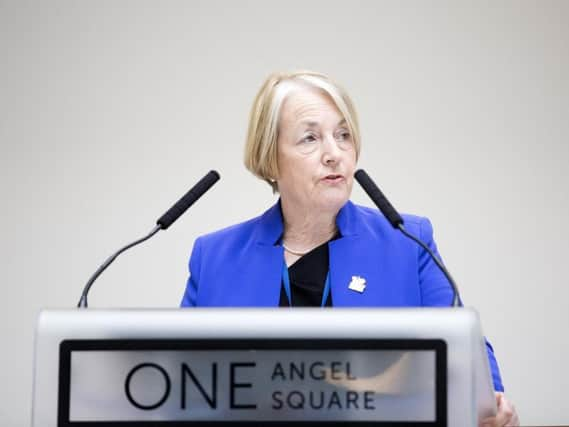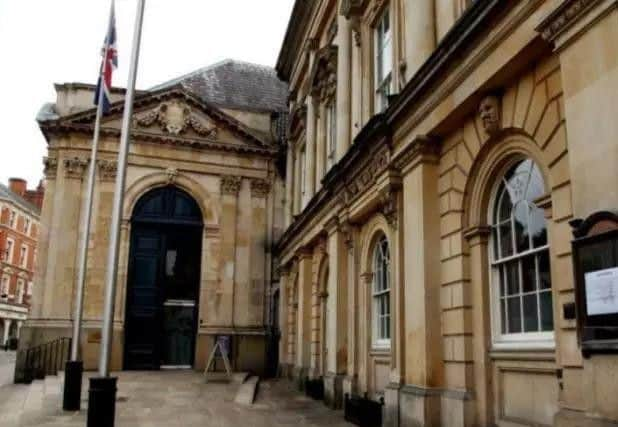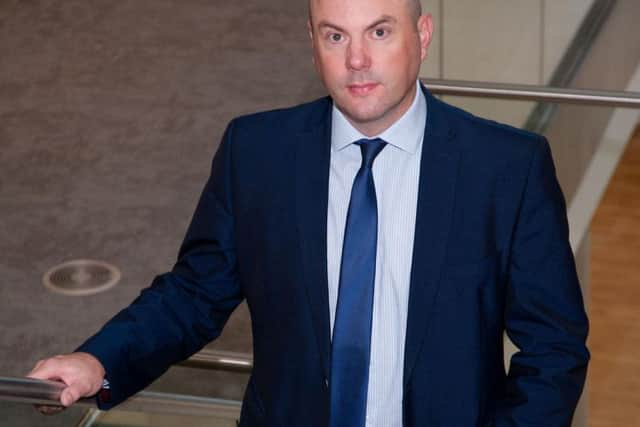Review of Northamptonshire County Council's annus horribilis


It created headlines not only nationally but across the world, making the front page of the New York Times and read about by people in Russia and Japan.
The council failed to balance its financial books and its long-term mismanagement led a government inspector to recommend it should be closed down and a new unitary system introduced to run local authority services in Northamptonshire.
Advertisement
Hide AdAdvertisement
Hide AdWe take a look back at an unprecedented year for the council.


The tone for what was to come in 2018 was set from the very earliest days of the year when Secretary of State for local government Savid Javid announced on January 9 that he was sending in an inspector to look into the financial management of the authority which was being led by Conservative Cllr Heather Smith and her cabinet.
Rumblings of financial problems had been voiced for some time with Conservative MP for Northampton North Michael Ellis speaking out against the budget the authority had proposed a few months earlier which was planning to cut bus services, close libraries and reduce trading standards in a bid to save millions.
But now things had taken a more serious turn with government intervention.
Advertisement
Hide AdAdvertisement
Hide AdWhile inspector Max Caller worked away throughout January, interviewing politicians, council officers and staff from the various borough and district councils across Northants, the authority’s financial problems were becoming clearer.


The first indication of how very serious things were was when the authority’s new chief finance officer Mark McLaughlin issued a 114 notice, a warning that the council may not be able to balance its books at the end of the financial year in April and was looking at a £21m overspend.
This was the first time that such a notice had been issued by any council in England for 20 years and it imposed emergency spending controls on the council.
It was quickly followed by an announcement by the council’s long-standing auditors KPMG that the council was planning to set an illegal budget. The auditor warned that the authority could be in breach of the Local Audit and Accountability Act 2014 because it was relying on too much on the sale of buildings and assets to make its finances balance.
Advertisement
Hide AdAdvertisement
Hide AdOn the last day in February the council approved its budget for the financial year ahead, involving £40m of reductions in services. The council outlined a plan which would see 21 of Northamptonshire’s 36 libraries close, a reduction in the winter service and highways maintenance programme, a pay freeze for staff and cuts to councillors’ allowances.


The budget caused shockwaves across every part of the county and the authority’s elected cabinet member for finance Cllr Robin Brown said: “This is the hardest budget that has ever been set.
“Seemingly the eyes of the world are on us today, and our backs are against the wall. There is a danger the county council might be operating beyond its means and go into the red. That is something we are not allowed to do, by law.
“We do not set a budget solely to balance the books. We set it to make sure the services our public expect, and deserve, are being delivered.”
Advertisement
Hide AdAdvertisement
Hide AdAt the start of March it emerged that the council may have been mis-spending its £35m health grant and was under investigation.
When it looked like things could not get any worse, they did on March 15 with the publication of the government inspector Max Caller’s findings.
He lambasted the political leadership at the council and said NCC had failed to comply with its duties under the Local Government Act 1999 and provide best value services for residents.
He also savaged the ‘next generation’ model which former chief executive Paul Blantern had introduced in 2014. The model had seen a move to transfer all of the council’s services into four separate entities but Mr Caller’s verdict was that the model was severely flawed and had catastrophically failed.
Advertisement
Hide AdAdvertisement
Hide AdHe said: “Instead of taking steps to regain control, the council was persuaded to adopt a ‘Next Generation’ model structure as the solution.
“There was not then, and has never been, any hard-edged business plan or justification to support these proposals. Yet councillors, who might well have dismissed these proposals for lack of content and justification in their professional lives, adopted them and authorised scarce resources in terms of people, time and money to develop them.
“This did not and could not address the regular budget overspends which were covered by one-off non-recurring funding sources.”
His report also gave the authority terminal warning, saying that he thought the council should be scrapped along with all other seven borough and districts in Northamptonshire and replaced with two new unitary councils.
Advertisement
Hide AdAdvertisement
Hide AdThat same day Cllr Smith, who had been leading the council since May 2016 when long-standing leader Jim Harker retired, stood down.
In her resignation speech she took aim at local MPs and the Government.
She said: “This has not been an easy decision for me as the authority goes through the most turbulent times it has ever known.
“The personal pressure of vicious public attacks by four local MPs seeking to make me the scapegoat has not been pleasant for anyone to witness.
Advertisement
Hide AdAdvertisement
Hide Ad“I have continued to fight for fairer funding for Northamptonshire residents, in spite of the personal attacks.
“As I was told a few days ago, ‘if the machinery of government is turned against you, you cannot win.'”
A new cabinet was put in place with former cabinet member for children’s services Matt Golby taking on what many saw as a poisoned chalice.
The new chief executive Damon Lawrenson then left his £1,050 a day role and in stepped Andrew Quincey, who was only to remain in post for four months before resigning and saying he was headed to Australia.
Advertisement
Hide AdAdvertisement
Hide AdOn March 27 Mr Javid announced he was minded to send in commissioners to take over the running of the council.
April was a frenzy of financial calculations and on May 6 the council declared that it had balanced its books. (This later turned out not to be the case, rather it had overspend by £35m).
The commissioners – Tony McArdle, former chief executive of Lincolnshire County Council, and experienced finance director Brian Roberts – arrived at the authority on May 20 and five days later auditor KPMG said it didn’t think the council had balanced its budget and instead had mis-used capital receipts – money made from building sales – to balance its books.
The commissioners said that the authority can be turned around and that it needed to spend within its means.
Advertisement
Hide AdAdvertisement
Hide AdMr McArdle said: “The authority has gone over a cliff and is now at the bottom looking how to to get back up.” He said his job was to put together a plan that would allow the council to get back on a firm financial footing.
In July an FOI revealed that the troubles at the authority had been clear as far back as November 2015 when the then chief finance officer Matt Bowmer told then chief executive Paul Blantern that he was thinking of issuing a 114 notice and that councillors needed to start to take some tough decisions around finances.
At the end of July last year the authority appointed experienced chief executive Theresa Grant, who had been running Trafford Council for the past decade.
August was another turbulent month as the council held a series of meetings with councillors asked to back a plan to outline a priority for services.Protesters gathered outside County Hall in Northampton, which was now up for sale, and the story hit national and international headlines.
Advertisement
Hide AdAdvertisement
Hide AdOn August 13 it was also announced that the council had lost a legal battle brought by library campaigners and would have to abandon its plans to close some libraries and start again. The legal proceedings cost the council £200,000.
At the end of the month the authority and all other local councils (apart from Corby) voted to put forward a bid to central government for two new unitary councils to be created.
In September it becomes clear the authority did not balances its books in 2017/18 and overspent by £35m – which it will have to repay by April 2019 along with a further £35m of cuts and a further £20m found by accountants brought in by the commissioners.
In October the £20m stabilisation plan was unveiled and met with widespread criticism. More than 200 headteachers signed a letter against the plan, which proposed to make cuts to special educational need provision.
Advertisement
Hide AdAdvertisement
Hide AdThe borough and district councils were also critical as a large chunk of the savings relied on them paying forward council tax collections early, a move not carried out anywhere in the county before.
Matters worsened again for the authority in November when a damning verdict by Ofsted of its children’s services was released. Ofsted revealed that 267 children were without an allocated social worker and criticised the management of the service. Social workers said they felt they had been ‘drowning in case work’ as the authority struggled to keep staff and was reliant on costly agency staff.
Central government announced that it was to send in a children’s commissioner after the Ofsted verdict and following a request from Tony McArdle.
But after all this turmoil there was some good news in December with the announcement from central government that it will allow the council £70m of capital receipts made from the sale of new headquarters One Angel Square to pay off its outstanding debt and to sit as a contingency for the year ahead.
Advertisement
Hide AdAdvertisement
Hide AdFurther welcome news came when the 2019/0 budget was announced. The £43m of anticipated savings were not too severe, with the council instead investing in new buildings and delivering services in-house. The proposed sale of historic County Hall in Northampton has also been halted.But it still remains to be seen if the commissioners, new chief executive and relatively inexperienced political cabinet can pull off a balanced budget this April.
One thing’s for sure, it has been an incredible year for Northamptonshire and the saga will undoubtedly continue in 2019.